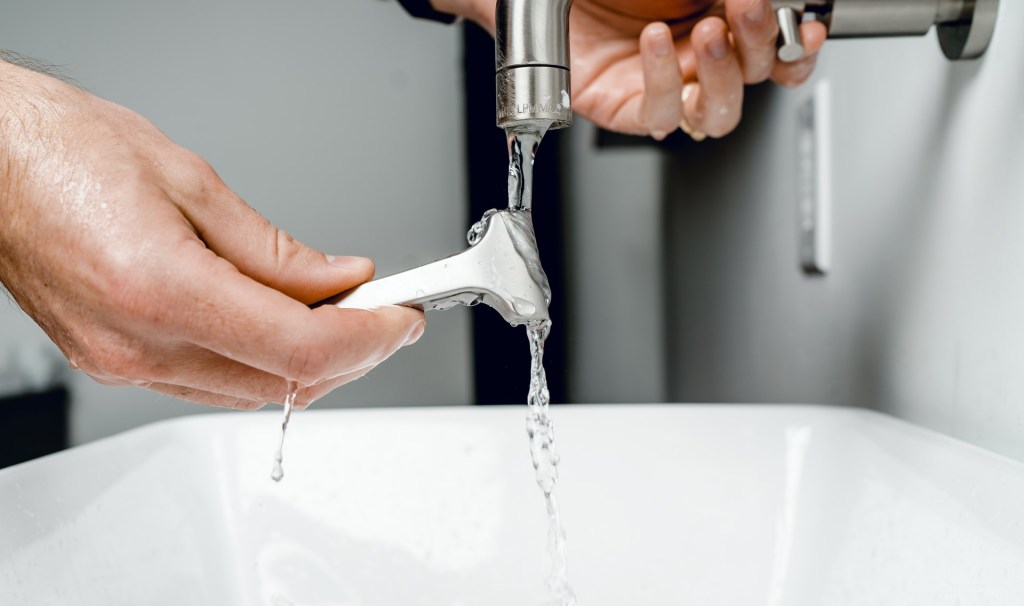It is not uncommon for garbage disposals to experience problems that require repair. To resolve the issue, some troubleshooting and patience may be all that is needed.
Your food waste disposal system usually stops working because of a foreign object or food material. Clogged blades can cause water to back up in your sink, making cleaning up a mess. Discover how to prevent disposal problems from occurring in the future, as well as how to resolve them once they do.
Avoiding Clogs
Avoiding clogs is as simple as being careful with what you dispose of. Garbage disposals keep sinks clean by removing food particles, but they should not be used to replace trash removal. It is important to scrape the dishes off before washing them to ensure the garbage disposal runs smoothly, making a better plumbing system essential.
In many kitchen drain lines, the inside is not smooth and wide open. Over time, galvanized iron drain pipes develop a scale within. After years of use, pipes can be choked with deposits. Modern plastic PVC or ABS plastic pipes can also have deposits, especially with hardened grease, which can cause clogs.
Common Garbage Disposal Issues
Garbage disposals can develop problems over time. While some are simple to fix, others should be handled by a professional plumber. Here are some common problems and easy solutions.
Strange Noises
Whenever you hear strange noises coming from your garbage disposal and it is humming but not grinding, this is a sign that something is jamming the flywheel. To remove the jam, turn off your garbage disposal, unplug it, and use an Allen wrench in the breaker socket found at the bottom section of the garbage disposal.
Start turning the wrench tool back and forth to get the flywheel to turn and set free the jammed particle in the impeller blades. Restore power and double-check that it is functioning properly.
Clogs
In general, garbage disposal clogs are fairly easy to fix. Your disposal can clog over time due to grease, food residues, sediment, and scale. The clog can be pushed through the drain by filling the sink halfway with water and using a plunger. As the plunger pushes the clog down the drain, the water should start to drain normally.
Not Turning On
In the event that your garbage disposal doesn’t turn on, there may be a problem with the power source. Make sure it’s plugged in first. Also, try pressing the reset button on the unit itself. This issue can also be caused by a tripped circuit breaker, a dead outlet, a malfunctioning circuit breaker, or a garbage disposal at the end of its life.
Leaking
It is inevitable that leaks will occur. Remove the garbage disposal unit and tighten the mounting bolts. If this does not solve the problem, push the sink flange upward until it is above the sink’s surface and apply the plumber’s putty between the flange and the sink.
How to Avoid Garbage Disposal Problems
To avoid garbage disposal problems, it’s best to know how to prevent them. To make your life easier, you should ensure that your garbage disposal unit is in good working order. You may experience more problems if you only use time-savers instead of conducting routine maintenance.
Regardless of whether you prefer other methods of waste disposal, keep your disposal in good shape by using it regularly.
In order to function properly, garbage disposals require regular maintenance. The disposal may become smelly, and non-functional, and require expert assistance if you fail to clean it and make necessary repairs. A professional plumber can give you detailed advice on how to keep your drains clean and your blades turning.
The Role Your Garbage Disposal Plays in Your Home’s Plumbing System
Installing a garbage disposal unit in your home is a great idea because it is an effective way to deal with common kitchen waste (such as uneaten food) by shredding it into small pieces.
The best part is having one installed by professional plumbers in Etobicoke as it’s both affordable and easy. However, garbage disposals are not indestructible. The following are a few do’s and don’ts:
- When using the disposal, run cold water (not hot). In spite of the fact that you probably use hot water to wash your dishes, cold water is best for cleaning the drain line of debris.
- To eliminate unpleasant odors, run a disposal cleaner down the pipes occasionally.
- You should avoid flushing grease or fat down the drain because it can cause the garbage disposal to clog. Blockages can also be caused by expandable foods, such as pasta and rice.
- Avoid dumping too much food waste down the disposal at once. When the disposal runs, add a little bit at a time, as the waste is broken up into small groups.
- Dispose of food items only.
Depending on the model, you should replace your garbage disposal every seven to twelve years. A professional plumber can help to evaluate any possible issues with your disposal if you use it frequently and (if necessary) install a new one.
Everything’s Plumbing Up Roses
Cleaning all the parts of your garbage disposal is the key to keeping it smelling fresh. Make sure the disposal is rinsed with clear or even soapy water after it has ground up the food.
When water leaves the sink on its way to the drainpipe, imagine the vortex of spinning water rinsing the sidewalls of the disposal. Finally, when using the garbage disposal, keep vegetable cuttings contained, and feed them slowly inside the unit while running cold water.
